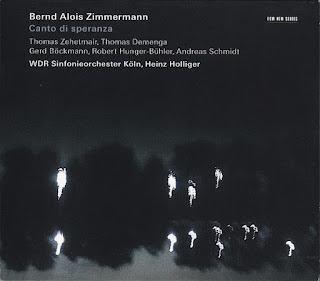Bernd Alois Zimmermann: Canto di Speranza (ECM)
Borrowed from library
For the four people who have been following my writings on this blog, you've no doubt noticed my lack of posts in the past few days. This is partially because of taking a weekend trip to Baltimore. It was my spring break, and my wife (among other things) wanted to revisit the American Visionary Art Museum. (I recommend it, by the way.) We packed a lot into a few days, visiting the Baltimore Museum of Art (where John Waters' personal collection is currently on display), dinner in Little Italy, visiting the neighborhood where I used to live. We took in concerts at Keystone Korner seeing the Renee Rosnes Quartet, with Steve Nelson on vibes, who's about to play in Pittsburgh, and An Die Musik, with the Paul Carr Quartet. Playing piano with that group was Miki Yamanaka, who I suspect will be a rising star in the jazz world (whatever that means, these days).
I never announce when I'm away from home on vacation. Now I'm back, and I've just read how JazzTimes ownership has been sold, and the current staff let go. This includes Mike Shanley, who has freelanced for the magazine for many years. It's bad enough Mike doesn't find any professional opportunities to write locally. His most recent local gig was with Pittsburgh Current, which unfortunately came and went very quickly. I don't know the inside scoop with PC, I only assume COVID didn't help their situation.
So it seems increasingly silly for me to continue writing these notices, and yet I will continue. Mike is an actual writer; I am committing words in a particular order to a virtual page. It's a little like, some people play the Theremin. I own a Theremin and wave my hands around it now and then.
I don't know that it's ever been easy, but it's a tough time to be in the arts. Or especially, particular arts. How do we monetize things people can get for free, or nearly so? Music, writing, and films in particular are at risk.
Personally, I'll be okay. I mean, I expect to be paid for my services, but I've never hinged my livelihood on being a musician. I've discussed this with my mother (a sculptor) and she's wondered, as have I, if it wouldn't have helped to have struggled a little bit more. There's little changing either of us at this point.
None of which has to do with the Zimmermann recording that is playing as I write this. I think this is the third Zimmermann recording I've mentioned on this blog, and how unfortunate it is he took his own life at age 52. Maybe things aren't so bad for me.
The disc has three works: Konzert (Concerto for violin and large orchestra, 1950), Canto di Speranza (Cantata for 'cello and small orchestra, 1952/57), and Ich Wandte Mich Und Sah an Alles Unrecht, Das Geschah Unter der Sonne (Ecclesiastical action for two speakers, bass solo, and orchestra, 1970).
The violin concerto is something of an early work, though Zimmermann would have been about 32 at the time, not old but not an early blooming artist either. Without studying the work more closely, it sound rather like a post-Romantic work. It doesn't sound like the Berg concerto, but you're in the right neighborhood.
Move forward a few years, and you can hear the more post-war, Darmstadt style creeping into the Canto. The title for that ("Song of Hope", and more significantly a cantata) and the later "ecclesiastical action", is some reflection of his Catholic faith. Can I go into greater depth? Afraid not. I should read more of the notes to these albums I suppose. I will.
Ich etc would be one of Zimmermann's final works, another being the Requiem for a Young Poet. It's full of empty spaces, speakers often accompanied by only single short or long notes, sometimes giving way to large, broad orchestral events. The pointillist influence of Webern on this clearly post-war composition seems very clear. I can't say whether it's Webern's music itself or a general trend in concert music at the time, but it seems to me to be the case.
There's an electric guitar in there prominently at times, an unusual thing to hear even in post-war orchestral composition. However, the piece very strangely ends, with a very brief Renaissance-sounding brass chorale, with a brief orchestral interruption, and it's done. What?
I wonder if Zimmermann's later works point towards a general interest in theater. I mean theater broadly. This, the Requiem, his impossibly difficult opera Die Soldaten, all point towards a general direction of combining text, acting, singing, collage, jazz, pointillism, orchestra, chamber music, and electronics. Zimmermann's interests are clearly more pluralistic than singular.
I'm left with the impression that once again, it is an impressive listen on CD, but is a piece that should be experienced live. I wonder, will I even have the opportunity? Or for that matter, hear any Zimmermann work in concert?

No comments:
Post a Comment